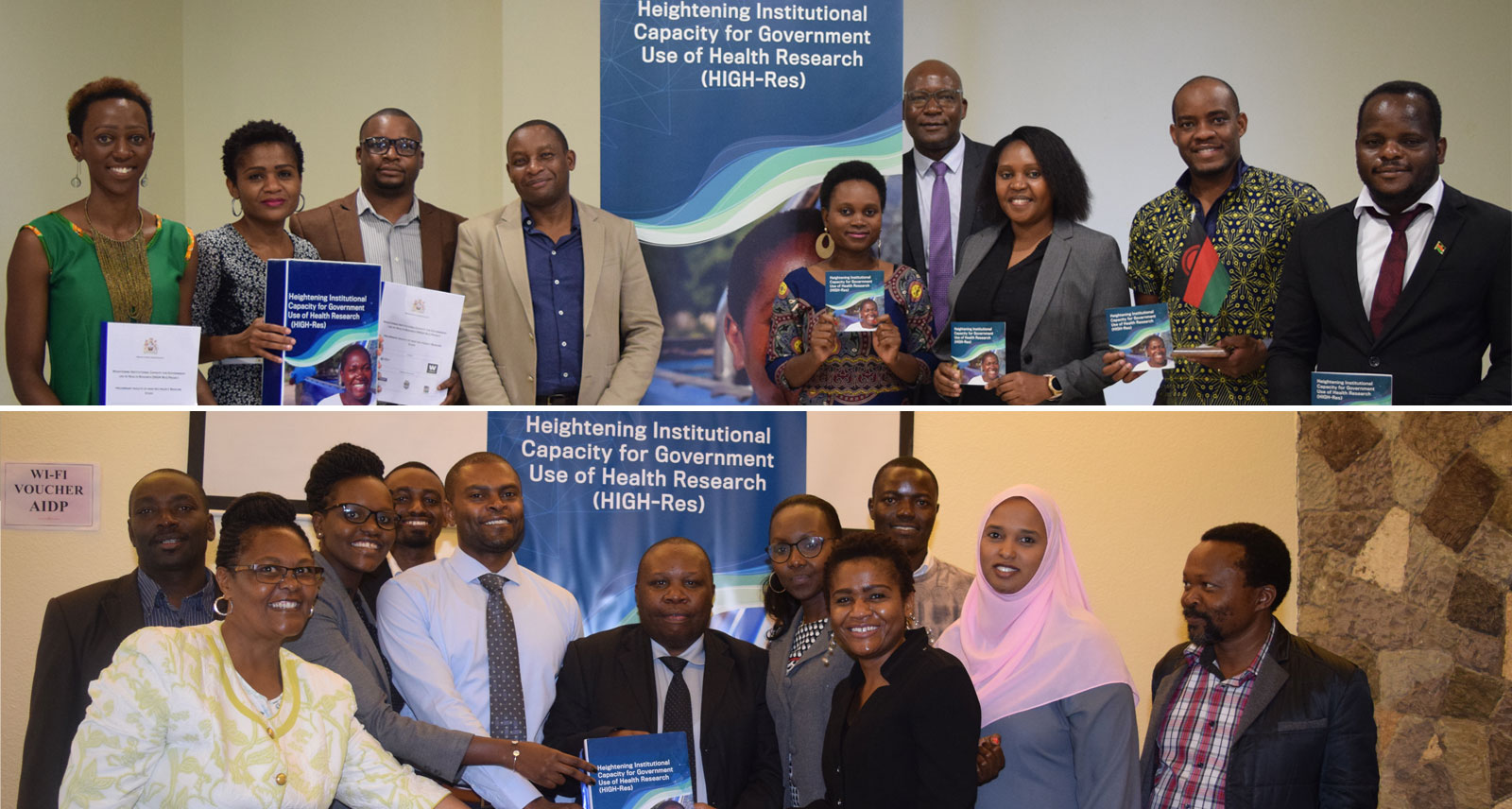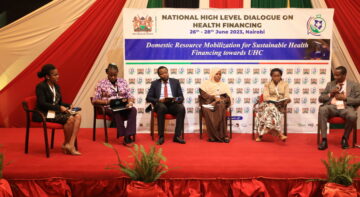Blogs

The quality, effectiveness, efficiency and performance of health systems is often hampered by weak and poor functioning institutional structures and processes. This is also coupled by barriers to evidence use in decision-making as well as weak capacity for research uptake. AFIDEP’s experience and accumulated evidence in health care suggest that key to improve and transform health systems is deliberate, focused and intentional institutional capacity strengthening.
In advancing the need for priority focus on institutional capacity and evidence use in health decisions and policies, AFIDEP and partners are currently implementing a collaborative programme known as Heightening institutional capacity for government use of health research (HIGH-Res). The three-year project aims to strengthen institutional capacity for the use of health research in policy and programme decisions in Kenya, Malawi and Uganda. The project brings together various partners under the HIGH-Res East Africa Consortium with Ministry of Health (MoHs) of the three countries engaged actively as implementing partners.
Since its rollout in 2019, HIGH-Res country project teams have been undertaking the inception phase of the study which included conducting baseline studies in the three countries; Kenya, Malawi and Uganda individually. The studies were undertaken as part of impact evaluation to evaluate effectiveness and impact of interventions to generate evidence on what works in strengthening institutional capacity for research use in decision-making.
Having completed the baseline of the impact evaluations early this year, AFIDEP and partners officially launched and formalised the HIGH-Res project in the three countries. The launch of the project in Malawi and Kenya was marked by the dissemination of the findings of the baseline studies conducted between January and February 2020. Overall, findings from these studies confirmed the need for HIGH-Res interventions in the three countries and provided important information to inform the refinement of the HIGH-Res project interventions and activities.
HIGH-Res launch in Kenya
HIGH-Res was officially launched in Kenya on January 28, 2020. The launch event included a dissemination meeting to share findings of the baseline study conducted in Kenya and provided an opportunity for extensive consultations with top heads of MoH and various research institutes. The launch was attended by key health stakeholders who included Senior Advisor to the Principal Secretary for Health – Dr. David Soti; Director of the Research Directorate – Dr Charles Nzioka; Heads of MoH directorates, departments and divisions; heads of research institutes; and representatives of development agencies.
Dr Nzioka delivered the keynote speech on behalf of Health Permanent Secretary, Susan Mochache. While giving his remarks, he encouraged partners to focus on building capacity where it is weakest while working on institutionalising and ensuring sustainability where this is already doing well. He noted the need for a Ministry [MoH] that is performing well across all Divisions, Departments and Directorates.
According to the findings of the baseline study shared during the launch, results confirmed the need for the interventions proposed by the project. Overall, the results provided crucial lessons that would help project implementers to refine their interventions and approaches. In her presentation of the baseline findings, AFIDEP’s Dr Rose Oronje appreciated that huge opportunities exist in Kenya that serve as entry points for HIGH-Res. Among them is supporting the realization of the government’s Universal Health Coverage (UHC) which is Kenya’s top priority. She noted that fast-tracking the realization of UHC has thrust research and evidence into the limelight. To this end, HIGH-Res would prioritize on supporting the strengthening of institutional capacities to regularly generate the evidence needed to drive the implementation of the UHC Agenda. This would also ensure the project remains relevant to the top leadership of MoH.
The dissemination of the baseline study results generated valuable discussions which recommended and/or committed to among others:
- MoH’s Division of Research to lead the coordination with MoH Divisions on hosting regular dialogues where researchers are invited to present research on specific issues the Divisions are prioritising.
- Fast-track the efforts to build the capacity of TWGs in research use and conducting operational research so that their work is based on credible evidence.
- MoH’s Research Division to regularly share priority research questions of the MoH and county governments with research institutes, either quarterly, bi-annually or annually; this will ensure the research they generate is responsive to needs of policymakers in the health sector.
- Need for regular forums between MoH leaders and leaders of research institutes in efforts to strengthen the role of research institutes in health sector decision-making.
Malawi Launch
In Malawi, the High-Res project was launched on February 21, 2020 and this also served as a dissemination meeting to share key findings from the baseline study. The meeting was attended by MoH heads of Departments and Divisions, heads of research institutes, and representatives of development agencies. Specifically, these included the Chief of Health Services – Dr Charles Mwansambo and representatives from the Royal Norwegian Embassy, College of Medicine and the Department for International Development.
Dr Mwansambo delivered the keynote address and key in the speech was the government’s commitment to supporting the HIGH-Res project. The support would enable the project to strengthen existing institutional systems and structures to enable a culture of evidence-informed decision-making (EIDM). In his speech Dr Mwansambo expressed hope, noting that, “this project will be beneficial to all health research stakeholders and that it will positively change the nation’s research culture and maximize the utilization of research findings in policy development”.
Dr Oronje’s presentation on the baseline study results highlighted how the findings would inform the planning of the project as well as allow feedback and consultations with the stakeholders -most of whom were interviewed during the study. Discussions during the dissemination with top heads from MoH as well as research institutes generated crucial recommendations and commitments. Leaders noted and committed to not only support but be actively involved in the project’s interventions including: the development of an evidence checklist to require and enable increased use of evidence in decision-making; and the review and revision of terms of reference for Technical Working Groups (TWGs); as well as improving the general coordination of TWGs.
Following the launch of the project in the country, the HIGH-Res project team has engaged Malawi MoH to strengthen its institutional capacity to use evidence in decision-making. Currently, the project together with the MoH is developing Terms of References (TORs) for research focal persons, development of evidence checklist, reviewing of TORs for technical working groups, mapping of research and training institutions, identification of research focal persons and support in the development of a strategic plan for the implementation of the Ministry’s Health Research Policy.
HIGH-Res in Uganda
High-Res implementation in Uganda was formalised with the signing of a memorandum of understanding (MoU) with the Uganda MoH. The MOU signing came as a result of one-on-one consultations with MoH top leaders early in the year. Results of the baseline study were also presented to the MoH’s performance review meetings. The baseline study revealed among others the lacking linkages and platforms for the MoH to interact and exchange information with researchers. This points to the need for the MoH to introduce platforms through which researchers can regularly present their research to relevant policymakers and staff to inform MoH’s decision-making.
AFIDEP had planned to disseminate the baseline study findings with Uganda’s MoH senior management and leaders of research institutes but this has been delayed due to the on-going COVID-19 pandemic. However, consultations with these heads will be prioritized once the COVID-19 situation improves.
HIGH-Res’ COVID-19 evidence response
COVID-19, which was declared a pandemic on March 11, 2020, by the World Health Organization has caused disruption across every sphere; from health, economy, social life to restrictions on movements and gatherings among others. For HIGH-Res, the pandemic has caused the delay of planned project activities. It has also hindered effective engagement with partners particularly MoHs of Kenya, Uganda and Malawi who have shifted all their focus to COVID-19 response.
In light of the COVID-19 disruption, HIGH-Res project teams have had to rethink approaches to planned activities and adapt to focusing on project activities that can be conducted remotely. On the other hand, project teams have identified an opportunity for the project to provide evidence for partner MoH’s that will inform country responses.
In Uganda, HIGH-Res has provided three rapid evidence reviews upon requests from the Uganda MoH. In Kenya, HIGH-Res project team is currently (between April 20 – May 31, 2020) conducting one rapid review, and a knowledge, attitudes, perceptions, and practice (KAPP) survey to improve the Kenya MoH’s COVID-19 responses. In Malawi, HIGH-Res project team are in discussions with the MOH to identify priority policy gaps to inform evidence synthesis that is responsive to the country’s needs and context. HIGH-Res project teams will continue to monitor the COVID-19 situation and offer the necessary support to the project’s partner MoH’s to generate evidence that can improve responses and possible solutions to beat COVID-19.
Related Posts





